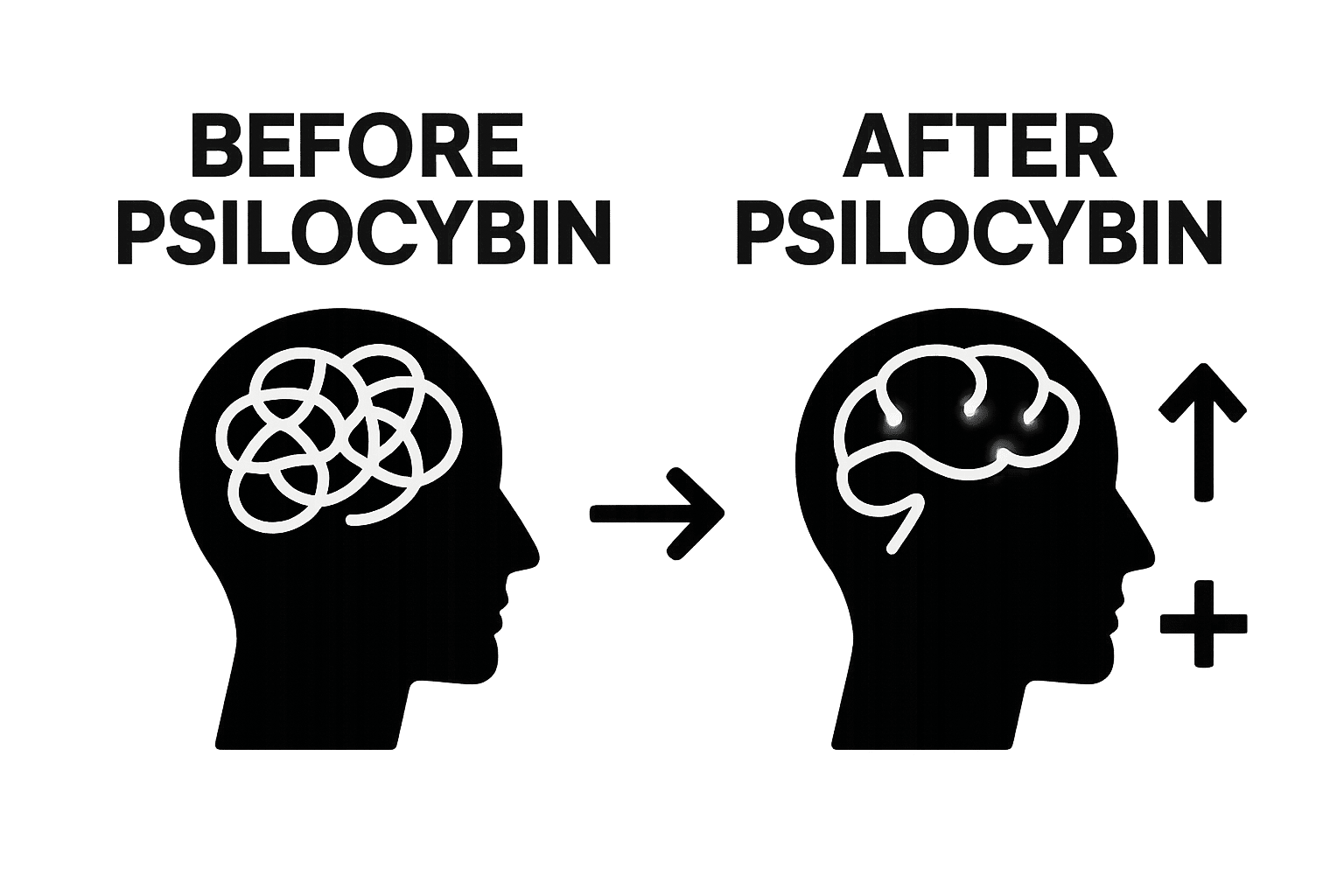Psilocybin is getting attention for how it changes the brain and lifts the mind. People often focus on the wild visuals and trippy feelings from magic mushrooms. But the real surprise is that psilocybin can reduce depressive symptoms for months after just one guided session. Scientists are starting to see it as a possible breakthrough for long-term mental health, not just a fleeting experience.
Table of Contents
- What Is Psilocybin And Its Effects?
- The Importance Of Long-Term Mental Health
- How Psilocybin Interacts With The Brain
- Potential Long-Term Benefits Of Psilocybin
- Understanding Risks And Considerations
Quick Summary
| Takeaway | Explanation |
|---|---|
| Psilocybin may reduce depressive symptoms. | Clinical studies suggest psilocybin offers sustained improvements for individuals with treatment-resistant depression. |
| It enhances emotional processing and resilience. | Psilocybin improves emotional regulation and psychological flexibility, beneficial for overall mental health. |
| Long-term mental health requires proactive strategies. | Continuous personal growth and strong emotional regulation foster long-term mental wellness beyond reactive treatments. |
| Risks exist with psilocybin use. | Physiological and psychological risks highlight the importance of careful consideration before consumption, especially in vulnerable individuals. |
| Neuroplasticity is influenced by psilocybin. | Psilocybin promotes neural connectivity and cognitive flexibility, potentially leading to significant psychological transformation. |
What is Psilocybin and Its Effects?
Psilocybin represents a naturally occurring psychoactive compound found predominantly in specific mushroom species, often referred to as “magic mushrooms” or “psychedelic mushrooms”. As a complex molecular structure, psilocybin has garnered significant scientific interest for its potential therapeutic and wellness applications.
The Chemical Composition and Neurological Interaction
At its core, psilocybin is a prodrug compound that transforms into psilocin once metabolized in the human body. This transformation enables direct interaction with serotonin receptors, particularly the 5-HT2A receptors in the brain. According to research from the International Journal of Molecular Sciences, this interaction produces profound neurological effects that can modulate perception, emotional processing, and cognitive functioning.
The neurological mechanism involves a fascinating cascade of neural interactions:
- Activation of serotonin receptors
- Disruption of default brain network patterns
- Enhanced neural connectivity across brain regions
Potential Wellness and Therapeutic Applications
Beyond its psychoactive properties, psilocybin demonstrates promising potential in addressing various mental health challenges. Clinical studies have explored its effectiveness in treating conditions such as treatment-resistant depression, anxiety disorders, and potentially addiction recovery. Read more about psilocybin’s potential for social anxiety relief, where researchers are uncovering its nuanced therapeutic mechanisms.
Key potential wellness applications include:
- Reducing symptoms of clinical depression
- Alleviating treatment-resistant anxiety
- Supporting emotional processing and psychological flexibility
- Potentially enhancing creative thinking and problem-solving capabilities
While research continues to evolve, psilocybin represents a fascinating frontier in understanding consciousness, mental health treatment, and holistic wellness strategies.
The Importance of Long-Term Mental Health
Long-term mental health represents a comprehensive approach to psychological wellness that extends far beyond momentary emotional states. It encompasses an individual’s sustained psychological resilience, emotional regulation, and overall cognitive functioning across different life stages and challenging circumstances.
Holistic Psychological Resilience
Mental health is not merely the absence of psychological disorders but a dynamic process of maintaining emotional balance, adaptive coping mechanisms, and psychological flexibility. Research from the Frontiers in Psychiatry highlights that sustained psychological wellness involves continuous personal growth, stress management, and the ability to navigate complex emotional landscapes.
Key components of long-term mental health include:
- Developing robust emotional regulation skills
- Maintaining strong social connections
- Practicing consistent self-awareness
- Implementing effective stress management techniques
Neuroplasticity and Psychological Transformation
Modern neuroscience suggests that mental health is not a static condition but a continuously evolving neurological state. Emerging research demonstrates that targeted interventions like psilocybin can potentially facilitate neuroplastic changes, offering promising pathways for psychological transformation. Explore more about microdosing and mental wellness techniques to understand these innovative approaches.
Potential long-term benefits of sustained mental health practices include:
- Enhanced cognitive flexibility
- Improved emotional intelligence
- Reduced risk of chronic psychological disorders
- Better overall life satisfaction and personal resilience
Understanding mental health as a proactive, dynamic journey allows individuals to develop more comprehensive strategies for psychological well-being, moving beyond reactive treatment toward holistic personal development.

How Psilocybin Interacts with the Brain
Psilocybin represents a sophisticated neurochemical compound that fundamentally transforms brain activity through intricate molecular interactions, offering unprecedented insights into consciousness and neural functioning. Understanding its neurological mechanism requires exploring its complex engagement with brain receptors and neural networks.
Receptor Binding and Neurochemical Transformation
Research from the International Journal of Molecular Sciences reveals that psilocybin operates primarily by binding to serotonin 5-HT2A receptors, triggering a cascade of neurological responses. Once ingested, psilocybin rapidly metabolizes into psilocin, which directly interacts with these critical neural receptors, dramatically altering brain communication patterns.
Key neurological interaction mechanisms include:
- Disrupting default mode network connectivity
- Enhancing cross hemisphere neural communication
- Temporarily reducing rigid brain activity patterns
- Promoting increased neuroplasticity
Neural Network Reconfiguration
Beyond simple receptor interaction, psilocybin fundamentally reshapes neural communication pathways. Brain imaging studies demonstrate that this compound enables unprecedented neural connectivity, allowing brain regions that typically do not communicate to form temporary, dynamic networks. Learn more about potential side effects and neurological interactions to understand the comprehensive neurological landscape.
Significant neural network transformations include:
- Reduced brain network compartmentalization
- Increased synaptic plasticity
- Enhanced emotional processing capabilities
- Potential reset of entrenched psychological patterns
These neurological interactions suggest psilocybin’s potential as a profound tool for understanding brain functionality, mental health treatment, and human consciousness exploration.
Potential Long-Term Benefits of Psilocybin
Psilocybin emerges as a transformative compound with profound implications for mental health and personal wellness, offering more than temporary psychological experiences. Its potential extends far beyond momentary alterations, presenting promising pathways for sustained psychological transformation and holistic well-being.
Mental Health and Emotional Resilience
Research from Frontiers in Pharmacology demonstrates significant long-term benefits in addressing complex mental health challenges. Clinical studies suggest psilocybin can potentially provide sustained improvements in psychological functioning, particularly for individuals struggling with treatment-resistant conditions.
Key potential long-term mental health benefits include:
- Substantial reduction in depressive symptoms
- Decreased anxiety and stress response
- Enhanced emotional regulation capabilities
- Improved overall psychological flexibility
Neuroplasticity and Cognitive Transformation
Beyond symptomatic relief, psilocybin appears to facilitate profound neurological remodeling. The compound’s ability to promote neural connectivity and brain network reconfiguration suggests potential for cognitive enhancement and psychological resilience. Explore our comprehensive microdosing schedule guide to understand safe and strategic approaches to leveraging these neurological benefits.
Significant cognitive and neurological potential includes:

- Increased neural pathway flexibility
- Enhanced creative problem solving
- Potential mitigation of addictive behavioral patterns
- Improved capacity for emotional processing
These emerging insights position psilocybin as a groundbreaking tool for understanding human consciousness, mental health treatment, and personal psychological development.
Below is a table summarizing the key long-term benefits of psilocybin for mental health and cognitive function, as discussed in this section.
| Benefit | Description |
|---|---|
| Reduction in depressive symptoms | Significant sustained decrease in depression, particularly among those with treatment-resistant depression. |
| Decreased anxiety and stress | Reduction in generalized anxiety and improved stress response over the long term. |
| Enhanced emotional regulation | Improved ability to process emotions and manage psychological challenges. |
| Improved psychological flexibility | Greater adaptability to life’s changes and emotional setbacks. |
| Increased cognitive flexibility | Promotion of creative problem-solving and adaptive thinking. |
| Potential mitigation of addiction | May help reduce addictive behavioral patterns through neural remodeling. |
| Improved life satisfaction | Broader improvements in personal resilience and satisfaction due to holistic mental wellness. |
Understanding Risks and Considerations
Psilocybin, while promising for mental health and wellness, requires careful and informed approach. Understanding its potential risks and individual variability is crucial for responsible exploration of its therapeutic potential. Comprehensive awareness helps mitigate potential negative experiences and ensures safer engagement with this complex compound.
Physiological and Psychological Risks
Research from the National Center for Complementary and Integrative Health highlights several critical safety considerations surrounding psilocybin consumption. Individual experiences can vary dramatically based on dosage, personal psychology, and environmental context.
Potential physiological and psychological risks include:
- Increased heart rate and blood pressure
- Temporary anxiety and disorientation
- Potential triggering of latent psychological conditions
- Unpredictable emotional and perceptual experiences
Individual Vulnerability and Contraindications
Certain populations face heightened risks when considering psilocybin usage. Individuals with pre-existing mental health conditions, particularly psychotic disorders like schizophrenia or severe bipolar disorder, should exercise extreme caution. Learn more about microdosing risks for specific consumer groups to understand nuanced safety considerations.
Key contraindications and vulnerable groups include:
- Individuals with personal or family history of psychotic disorders
- People with severe cardiovascular conditions
- Those currently taking certain psychiatric medications
- Individuals with unstable mental health backgrounds
Responsible exploration requires thorough personal assessment, professional medical consultation, and a comprehensive understanding of one’s psychological and physiological landscape.
This table outlines the main physiological and psychological risks, as well as specific vulnerability factors, that should be considered when evaluating psilocybin use for wellness.
| Risk/Vulnerability | Explanation |
|---|---|
| Increased heart rate and blood pressure | Psilocybin can cause temporary cardiovascular changes that may be risky for some people. |
| Temporary anxiety and disorientation | Short-term psychological distress or confusion can occur during the experience. |
| Triggering latent psychological conditions | There is potential for underlying conditions (like psychosis) to surface or worsen. |
| Unpredictable emotional/perceptual effects | Individual experiences may vary, leading to unpredictable or intense sensations. |
| Personal/family history of psychotic disorders | Higher risk of adverse effects for individuals with schizophrenia or similar conditions. |
| Severe cardiovascular conditions | Enhanced physiological risk for those with serious heart issues. |
| Psychiatric medication interactions | Potential for harmful interactions with certain prescribed mental health medications. |
| Unstable mental health backgrounds | Increased vulnerability to negative outcomes if mental health is not stabilized. |
Ready to Explore Lasting Mental Wellness?
You have learned how psilocybin interacts with the brain, supports emotional balance, and may help address ongoing mental health challenges. Many readers struggle to find sustainable mental clarity or mood support using traditional solutions. If you are searching for a safe, guided way to experience potential benefits for long-term mental health, explore our Mental Health collection for in-depth resources and product options designed for your wellness journey.

Discover the difference microdosed psilocybin products can make for mental resilience and cognitive support. Visit Kind Stranger now to view our capsules and gummies, learn about dosing and safety, and take the next step toward emotional balance. Invest in your long-term well-being today while gaining access to thoughtful mental health insights and supportive guidance. Your wellness can begin now.
Frequently Asked Questions
What is psilocybin and how does it affect the brain?
Psilocybin is a naturally occurring psychoactive compound found in certain mushrooms, often referred to as ‘magic mushrooms.’ It transforms into psilocin in the body, interacting primarily with serotonin 5-HT2A receptors, which alters perception, emotional processing, and cognitive function.
What are the potential long-term benefits of using psilocybin for mental health?
Long-term use of psilocybin may lead to significant improvements in mental health, including reduced symptoms of depression and anxiety, enhanced emotional regulation, and increased psychological flexibility and resilience.
Are there any risks associated with psilocybin use?
Yes, there are potential risks, including increased heart rate, anxiety, and the triggering of latent psychological conditions. Individuals with pre-existing mental health disorders should exercise caution and consult healthcare professionals before use.
How does psilocybin promote neuroplasticity?
Psilocybin may facilitate neuroplastic changes by promoting increased neural connectivity and reshaping brain communication pathways. This can enhance cognitive flexibility and emotional processing capabilities, leading to positive psychological transformation.
Recommended
- Psilocybin Side Effects: What Wellness Seekers Need to Know 2025 • KIND STRANGER
- Psilocybin for Social Anxiety: Natural Relief in 2025 • KIND STRANGER
- Psilocybin Withdrawal Symptoms: What to Expect in 2025 • KIND STRANGER
- Psilocybin Microdosing Schedule Guide 2025: Safe and Effective Plans • KIND STRANGER


Comments
There are no comments yet.